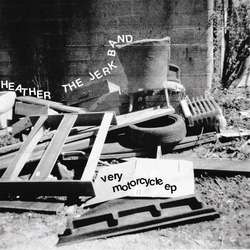Noise By Numbers are a group of Chicago punk veterans, and Over Leavitt gives a nice first impression. The sepia-tinged sunset photo of an industrial district gives a relatable, down to earth feel. On the flipside there’s a photo of the band playing a house show. Sure, they’ve put their sweat equity into the scene, but there’s no sense of entitlement to their record. They still drive around in a van, put out records on small labels, and let their music do the talking. The band includes Dan Schafer (Screeching Weasel, Riverdales, Methadones), Jeff Dean (The Bomb, All Eyes West), Rick Uncapher (Textbook), and Jimmy Lucido (Light FM).
While Schafer’s name conjures Ramones-core, Noise By Numbers continue to distance him from such a stigma. The opener, “Song for Emily” utilizes familiar power chords, but the focus is on elongated vocals, mid-tempo rhythm, and melodic flow—all themes that carry throughout the record. If a comparison has to be dropped, think somewhere between the Methadones and recent Green Day. There’s an interest in using a pop punk foundation, but drawing it out with more complicated structures and predominant melodies, mostly coming from the frontman rather than through group vocals. The power chords are used mostly to give an energetic boost here and there. The idea works well, but sometimes runs out of gas after that 2:00-2:30 marker, where the bridges get repetitive and Schafer’s vocals can get monotonous. While the lead singer intent is admirable, his voice isn’t really suited to the task and a few call and responses mixed in would keep the energy levels up. Instead, songs with more emotive displays, as in “Swarm of Flies,” sparkle and fade without maintaining as much pull and the epic feel of “Yes, You” goes on just a little too long.
More range is shown in “Reaching for the Sun,” which separates from Schafer’s past, though there are hints of Dean’s other band, The Bomb. Overall, the band sounds much as one would expect with so many years in the Chicago scene: varied influences are at play, with distinct melody remaining the core element of the songwriting instead of bombastic aggression or buoyant singalongs. The songs rely on highs and lows, switching up tempos frequently (and without awkwardness), using tonal difference to express themselves. In “Radiate,” powerful chords play over Schafer’s mid-tempo vocals, giving a pent-up, contained feeling while the guitar is ready to burst. When the breakdown comes, it’s a fluid, emotional release rather than a cathartic blast.
As a whole, Over Leavitt isn’t a bad record. The songs are well crafted and the different nuances from the musicians mesh well. The downside mostly comes in form of monotony, as the drumming holds almost the same beat over the eleven songs and Schafer’s voice can feel droney. Fans of the members’ extended discography should be interested, but it just doesn’t leap ahead of the pack.





